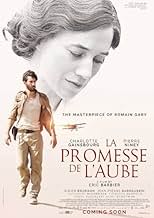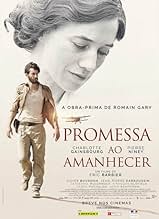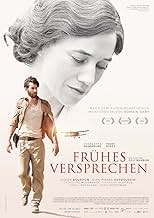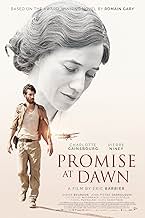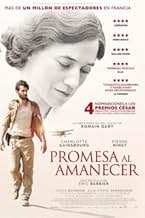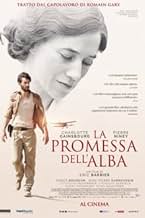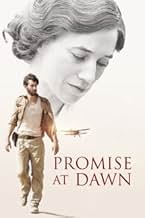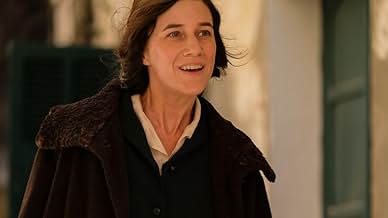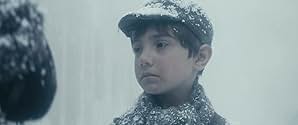Romain mit seiner Mutter im Poland lebt. Eines Tages die deutsche Armee marschiert in Romains Heimatland. In dunkler Vorahnung, was ihnen drohen könnte, fliehen er und seine Familie in Richt... Alles lesenRomain mit seiner Mutter im Poland lebt. Eines Tages die deutsche Armee marschiert in Romains Heimatland. In dunkler Vorahnung, was ihnen drohen könnte, fliehen er und seine Familie in Richtung Frankreich, in der Hoffnung, den Nazis zu entkommen.Romain mit seiner Mutter im Poland lebt. Eines Tages die deutsche Armee marschiert in Romains Heimatland. In dunkler Vorahnung, was ihnen drohen könnte, fliehen er und seine Familie in Richtung Frankreich, in der Hoffnung, den Nazis zu entkommen.
- Regie
- Drehbuch
- Hauptbesetzung
- Auszeichnungen
- 1 Gewinn & 7 Nominierungen insgesamt
Empfohlene Bewertungen
The film is almost entirely told as a flash-back, in which the life of the tormented writer is told in his own words. It is the equally gruesome, as beautifully told "confession" of a crushing motherly love and the destruction of the child's psyche under that pressure. All storylines are more than interesting, the two actors shine, but there is a postponed climax on script level. When it's there - horrific in it's consequences - we are one hour and a half in the movie. And that is too long to keep the attention fully focused.
The horrific consequences of the destructive mother lie at a deeper level of development of the writer and, in my opinion, should have been expressed less poetically and more realistically. But that is a style choice. It's a French movie after all, right?
Nonetheless, with great pleasure and deliberation, I have looked at the ode to a ruined life, where the talent of being a writer turns out to be both a victory and a curse.
Gary was born in Poland, but became a renowned author in France. Some of what's in the movie is factual. The facts are exciting--Gary moved to France, and when the Germans conquered France, he joined the RAF.
One of the most exciting scenes in the movie shows Gary, as the navigator of a RAF bomber, talking the pilot--who is temporarily blinded--to the bombing target, and then back to the RAF airfield. (This actually happened.)
However, the movie isn't about Romain Gary's daredevil life. It's about Romain Gary and his mother, Nina Kacew, played by Charlotte Gainsbourg. If we are to believe the author, his mother played an immense role in his life--teaching him what he had to know, urging him on, and coming to him in dreams and hallucinations when she wasn't actually with him.
Who could have told us--other than Gary--how much of this was true? True of not, it certainly makes for an interesting script. The script only works because Gainsbourg is such a great actor. She's not always someone we like, but she's someone in whom we believe. I don't know another actor who could have pulled this off as well.
Incidentally, there's a confusing episode when the film starts. It's Day of the Dead in a small city in Mexico, and someone--we later learn that it's Gary--decides that he's dying and needs to go to a distant hospital in Mexico City.
Notice that the talented Catherine McCormack plays his wife, Lesley Blanch. Gary was a diplomat, and he and his wife were stationed in Mexico for a time, so maybe this really happened. (Gary later divorced Blanch and married Jean Seberg, darling of the French Nouvelle vague.)
I enjoyed this movie and would recommend it for people who like epics about famous, successful people. Promise at Dawn has a moderately strong IMDb rating of 7.2. I thought it was better than that, and rated it 8.
The book and the film tell about two love stories. The first of these is the love of a mother for her son, an unlimited love, a love that is remembered by the writer over the years, a love that determined the course of his life. In most of the world's literature and languages for such a mother the common expression is 'Jewish mother', only in Hebrew such a mother is called a 'Polish mother'! Both fit here. The son's answer is, of course, the book that Romain Gary wrote decades later, the book that inspired the film. I can say without hesitation that this book is unique in the literature in its description of the relationship between a mother and her son. The second love story is for France. The book's heroine passionately loves her country of adoption, the country that saved her life, sheltered her, gave her the dignity. Nina Kacew educates her son to love France, returning the love that seems to have been offered to them unconditionally. However, none of the two love stories are happy to the end. Romain Gary's life will be cut short by suicide, and it is impossible to establish which were the sources of despair and disappointment that led to this, but it can not be ruled out that the partial failure of the life plan predestined by his mother had a role. The love of the Jews sheltered by France for their country and their readiness to return their gratitude with all sacrifices, including life, was hardly put to the test of history, from the Dreyfuss case to the racial persecutions and deportations during the Second World War. The book and the film end up in an optimistic note, but readers and viewers know this is not the whole story.
'La promesse de l'aube' is a captivating and exciting movie. Many viewers, probably, like me, know the intrigue and the characters, yet the precision of the details, together with the sensitivity and the passion of the actors, create a moving story that cannot leave the spectators indifferent. Charlotte Gainsbourg is fascinating as a woman living through several ages, struggling to survive and succeed, radiating the fierce love for her son, conveying her passion for life and her love for the adoptive country. All the three actors who represent the writer at different ages are excellently chosen and play very well, with a special mention for Pierre Niney who creates again a superb role and consolidates in my eyes his position as one of the best French actors of the moment. Watching the film not only did not disappoint me at any point in comparison with the emotions related to reading 'La promesse de l'aube' many decades ago, but added new dimensions to the intellectual experience around this exceptional book.
Wusstest du schon
- WissenswertesTo prepare the character of Nina, actress Charlotte Gainsbourg admits to have been inspired by her paternal grandmother, also of Russian origin.
- Zitate
Roman Kacew, dit Romain Gary: I made the promise to straighten the world and lay it at his feet
- VerbindungenFeatured in ACS France (2018)
- SoundtracksThe Twins
Composed by Max Richter
Top-Auswahl
- How long is Promise at Dawn?Powered by Alexa
Details
- Erscheinungsdatum
- Herkunftsländer
- Offizielle Standorte
- Sprachen
- Auch bekannt als
- Promise at Dawn
- Drehorte
- Bordighera, Imperia, Liguria, Italien(Interior and exterior scenes)
- Produktionsfirmen
- Weitere beteiligte Unternehmen bei IMDbPro anzeigen
Box Office
- Weltweiter Bruttoertrag
- 9.242.157 $
- Laufzeit2 Stunden 11 Minuten
- Farbe
- Seitenverhältnis
- 2.39 : 1
Zu dieser Seite beitragen



